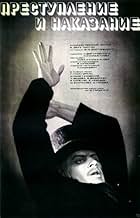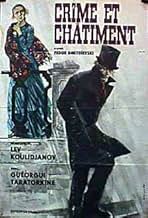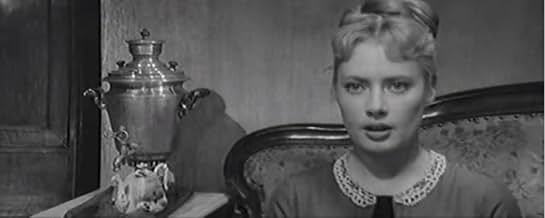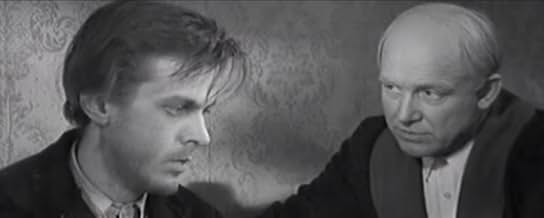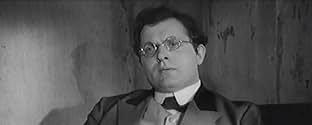Prestuplenie i nakazanie
- 1970
- 3h 41min
Raskolnikov, un exalumno empobrecido, mata a un prestamista y a su hermana. La policía sospecha de él. Llega su familia, seguida de pretendientes. Se hace amigo de la hija de un empleado, So... Leer todoRaskolnikov, un exalumno empobrecido, mata a un prestamista y a su hermana. La policía sospecha de él. Llega su familia, seguida de pretendientes. Se hace amigo de la hija de un empleado, Sonia, una prostituta que lo insta a confesar.Raskolnikov, un exalumno empobrecido, mata a un prestamista y a su hermana. La policía sospecha de él. Llega su familia, seguida de pretendientes. Se hace amigo de la hija de un empleado, Sonia, una prostituta que lo insta a confesar.
- Dirección
- Guionistas
- Elenco
- Marmeladov
- (as Yevgeniy Lebedev)
- Pyotr Luzhin
- (as V. Basov)
- Dmitriy Razumikhin
- (as A. Pavlov)
- Alyona Ivanovna
- (as Ye.Yevstratovna)
- Yelizaveta Ivanovna
- (as L. Sokolova)
- Nastasya
- (as I. Makarova)
- Zametov
- (as V. Nosik)
- Lebezyatnikov
- (as Yu. Medvedev)
- Zosimov
- (as Ye. Lazarev)
- Ilya Petrovich - poruchik 'Porokh'
- (as Yu. Sarantsev)
- Nikodim Fomich
- (as Yu. Volkov)
- Dirección
- Guionistas
- Todo el elenco y el equipo
- Producción, taquilla y más en IMDbPro
Opiniones destacadas
The film perfectly captured almost every nuance of the novel, such as Rodya's claustrophobic physical and mental existence as well as the bleakness of St. Petersburg's slums. The characters were all faithfully portrayed, except maybe for Svidrigailov. He seemed to be portrayed more sympathetically than I think Dostoevsky would have intended. While he certainly was a tragic figure, I didn't read him as being quite as gallant as he appeared in the film.
My only other gripe is one I've read on here somewhere else. There is no hint of the redemption Raskolnikov experiences which is so essential to the whole story. But don't let this, or any of the other comments on IMDb about the film's pace or length deter you from watching it. Anyone who loves the novel and yearns to hear the story told in its native tongue will find the experience a rewarding one.
This being said, I usually have a fondness for adaptations of this novel, just like I have toward adaptations of Shakespeare's Hamlet or MacBeth. Even if the films are not masterful, they might still greatly benefit from the source material and stand out above average. The version by Sternberg and Peter Lorre is comically short, but has a certain charm. The same goes for the modernized treatment of Finnish director Aki Kaurismäki. Just because adapting Dostoevsky is hard, doesn't mean you can't try it.
This adaptation, by director Lev Kulidzhanov, is often hailed as one of the best "Crime and Punishment" adaptations. And it is very good. Due to the lengthy duration clocking in at almost four hours, this film has time for proper character development and thorough depiction of Raskolnikov's agony. And the visuals of the whole thing serve it great. This film is black and white, but most often it's really nothing but gray in its color palette, making it feel like a fever dream that refuses to end. It's dead calm and tormenting, which fits the novel perfectly.
The lack of a novel-like storyteller in a movie is fixed by giving the characters long monologues and dialogues, that can last small eternities. This really adds some feel of the book to the film. There are minor differences and things omitted from film, but this is always the case with adaptations, and not against the law. If some versions show Raskolnikov commit his crime mostly because of his Nietzche-like super-mensch theories, this adaptation stresses the financial difficulties that he faces. I love the look of his apartment in this film, with his living quarters being much smaller than in some western adaptations. When the protagonist has visitors, which is nearly always, it feels like they are really pressing towards his skin. This film is very claustrophobic.
My favorite character in this adaptation, and in most adaptations, is Porfiri, who is played in quiet determination by Innokentiy Smoktunovskiy. This was my favorite performance in the film, the character is sparingly used and many of his lines are kept in tact from the novel. The Raskolnikov in this version is one of the most distant, and least-relatable I have seen in any film. This might have to do with the subtle way, that the lead performance has been written and directed. He has many great scenes too.
In conclusion, in all areas of film-making, this Soviet film has merits to it. Though it's not perfect, and no adaption can beat the book, it's dark, ambitious, made with determination and appreciation for the source text.
¿Sabías que…?
- TriviaTatyana Bedova's debut.
- Citas
Marmeladov: Poverty is no vice and that's the truth. And drunkenness is no virtue either. But misery, my dear sir, that's what is immoral!
- ConexionesFeatured in Legendy mirovogo kino: Inna Makarova
Selecciones populares
- How long is Crime and Punishment?Con tecnología de Alexa
Detalles
- Fecha de lanzamiento
- País de origen
- Sitio oficial
- Idioma
- También se conoce como
- Crime and Punishment
- Productoras
- Ver más créditos de la compañía en IMDbPro
- Tiempo de ejecución3 horas 41 minutos
- Color
- Mezcla de sonido
- Relación de aspecto
- 2.35 : 1
Contribuir a esta página


